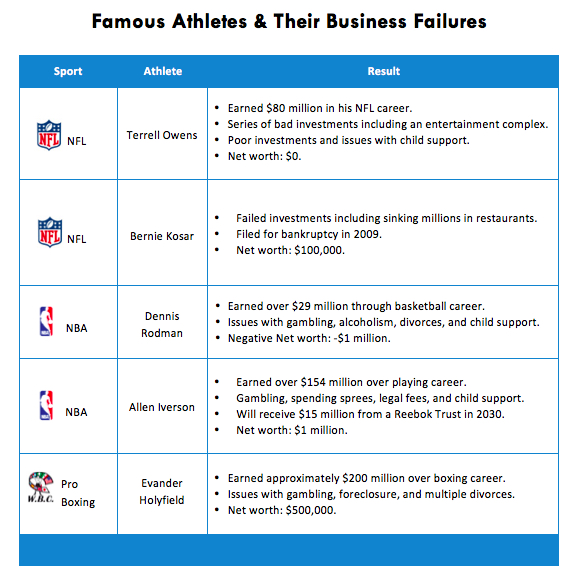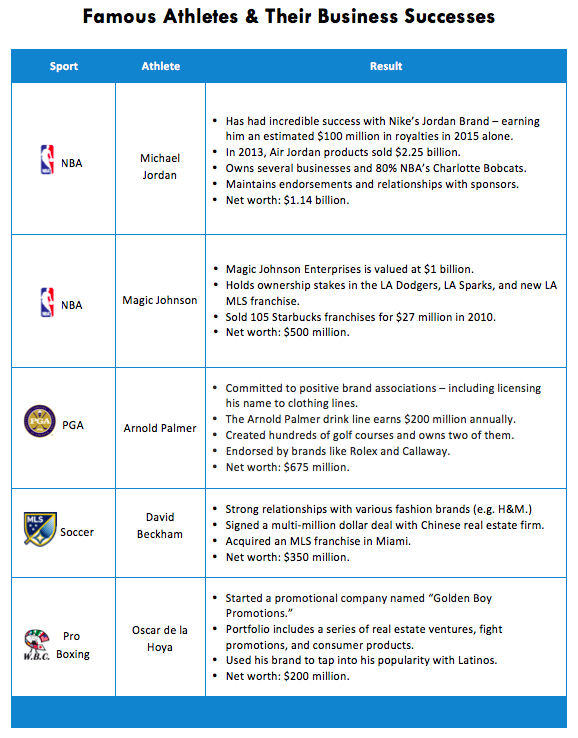Putting the “Professional” in Professional Sports

On July 21, 2016, a headline made the sports community buzz – Nike’s Jordan Brand of footwear unveiled its latest version. The new Air Jordan shoe is a tribute to the first 1985 iteration, which demonstrates how far the brand has come since the original sneaker was released. Basketball Hall of Famer Michael Jordan had global celebrity power when he partnered with Nike, but how did he become a professional on and off the court? How did he parlay his basketball career into becoming a business mogul?
While investing in sports is becoming increasingly lucrative and the salaries of elite professional athletes can be in the tens of millions annually, athletes themselves are progressively using their stardom to launch their own business ventures. From opening restaurants to launching their own clothing brands, some athletes successfully transition their personal brand into corporate ones.
But why do some athletes succeed while others fail?
Off-the-Field Career Grand Slams
Some players are bringing heightened levels of professionalism to their brand that exceed their on-field athleticism, and have had lasting financial success beyond retirement from sports. What sets these players apart from their peers is how they see themselves, act on their self-awareness to support longevity beyond the field, and leverage their star power.
Being a true “professional” in sports is not only an investment in a player’s brand and image, but it is about having an outlook that can translate into long-term business opportunities. Sadly, once athletes are no longer in the limelight, their phones will stop ringing, and they will be forgotten. The most successful retired athletes are the ones who began planning for retirement well before the game retired them.
Examples in Sports – Separating the Moguls from the Forgotten
Here are examples of athletes who have successfully used their sports careers to secure ongoing wealth, and those that squandered their stardom.

Sources: Rant Sports (2014), The Richest (2014)
Key factors separating successful athletes from the forgotten who face financial distress go beyond issues we discussed in our article on NFL players going from super bowls to sofa surfing. To become a mogul and have a lifetime of career wins, athletes need to turn their player access into broader business success in fundamental ways. They need to leverage their star power and transform it into business acumen.
Claiming Business Success as Athletes
Business and sports have many commonalities. They require competitiveness and creativity, demand determination, and require strategic approaches to reach critical goals. Retired players like Magic Johnson recognize this, which is why Johnson has built a business empire in industries that surpass his success in sports. He owns franchises, invests in real estate, and is a sports executive as a part-owner of sports teams.
Players who see their investments fail and wealth disappear often engage in poor financial planning and make bad decisions. They may have avoided economic ruin if they approached their time as professional athletes with a more strategic and long-term view – recognizing their time in sports is fleeting.
Many players, like Allen Iverson, spent frivolously, invested unwisely, and did not treat their lives as professional athletes like professionals do in other industries. They also let personal issues consume their bank accounts and tarnished their public image. Arguably, they surrounded themselves with the wrong people and lacked good judgment.
Here are key factors that set apart the Michael Jordans from those who have limited career prospects and less financial stability after retirement from sports.
1. Leveraging Their Brand
One of the more important things athletes can do is to approach their time as players like they are in any other profession. They must extend that professionalism beyond the field. Not only do athletes need to use good judgment both on the field and in their private lives, but they also need a heightened awareness that their image is their most important asset beyond their athleticism.
By having strong a brand value, athletes can create and develop business opportunities. They can attract lucrative sponsors and endorsement deals. More importantly, they can attract potential business partners.
This requires a mindset ready for growth and business savvy. Athletes should see themselves as CEOs of their brand. They are running a small corporation, and their core product is their image, name, and star power.
Much like any other industry, athletes need to know their market and consumer. Once they know who they appeal to, they need to make the most of those relationships to target their core audience. For example, Oscar de la Hoya built his promotional company around his wide appeal to a Latino demographic and has enjoyed great success. Not only is de la Hoya leveraging his star power, but he is also doing it strategically to maximize his business opportunities.
2. Selecting Good Career Advisors
Successful people in business often rise to the top by having a great support network. This rings true for athletes. Far too often, when we see athletes fall and embroiled in career-limiting scandal, it is because they have an entourage that brings them down instead of one that lifts them up.
A good start would be to develop a relationship with an agent and a career advisor focused on an athlete’s success beyond sports. Having a strategic career advisor goes a step further than the services many agents may offer. Having a good coach on the field can make all the difference with player performance. The same can be said about coaches off the field – impacting an athlete’s ability to become a businessman with sustainable wealth and business opportunities.
Athletes need to build relationships with people that believe in and care about their success and brand growth beyond sports. Advisors can help develop sustainable strategies while athletes are playing, offer critical advice, and help ensure post-career success. Finding someone to help them stay “professional” can be a vital investment.
For instance, it was Michael Jordan’s agent, David Falk, that promoted and negotiated a deal with Nike. If it were not for him, Jordan would have likely signed a deal with Adidas, which was his favorite shoe brand. Advisors can help athletes see the big picture, and can turn goals and a vision into bankable realities.
3. Aligning With the Right Endorsements
It is imperative that athletes form the best partnerships and alliances. While it may be hard to turn down quick money, athletes should care about signing endorsement deals with a strategic eye. To improve their business acumen and be stronger stewards of their image, athletes should consider the quality of their endorsements, and not just evaluate the quantity of them.
They should also focus on sustainable partnerships that go beyond sports. For example, Arnold Palmer avoided endorsements mainly based on winning because he knew that he would eventually start losing one day. By aligning with organizations that promoted his personal brand rather than just his win-loss record, the 86-year old retired golfer has fostered lucrative, sustainable business partnerships that exist today – well past his golfing career heyday.
Final Thoughts
When athletes recognize they are not just players on the field but are walking brands and carry themselves accordingly, they can set themselves up for bigger opportunities that can provide economic security after retirement from sports. The key to success is maintaining a clean image, having positive and supportive people in their inner circle, recognizing they are business professionals and employees within larger organizations, and understanding they need to play the “office politics game” across their industry. Athletes need to be strategic to come even close to claiming the success reached by Michael Jordan or Magic Johnson.
There is no singular solution to ensuring business success for athletes. Sadly, there are no “get rich quick” tips. Rather, the best avenue is to pursue strategic approaches to creating opportunities for careers after sports. By putting professionalism above all else, sponsors and other business investments alike become much more lucrative and likely.
The Azara Group is dedicated to advancing the professional and post-professional careers of athletes at any point in their lives. Career planning, business strategy, and negotiation skills are essential. Our goal is to help athletes prepare for the next phase in their career by leveraging their current notoriety while thinking through their career transition strategy. We want professional athletes to live their dreams to the fullest, and we will be there every step of the way to promote lasting success beyond sports.
The Azara Group (TAG) is a consulting firm that promotes the development of leaders in an increasingly competitive and diverse marketplace – providing strategy consulting services and leadership training services to advance professional and life success. TAG leverages expertise in career strategy, diversity, negotiation skills, and business acumen to provide strategic advice and consulting services to help people and organizations get what they want, achieve their goals, and advance their business and career objectives. TAG also helps companies better attract, retain, and promote diverse talent, and develop robust diversity platforms and strategies to create a more inclusive workplace.
The Azara Group welcomes your direct comments and feedback. We do not post comments to our site at this time, but we value hearing from our readers. We invite you to share your thoughts with us. You can contact us directly at info@theazaragroup.com.
 The Azara Group
The Azara Group